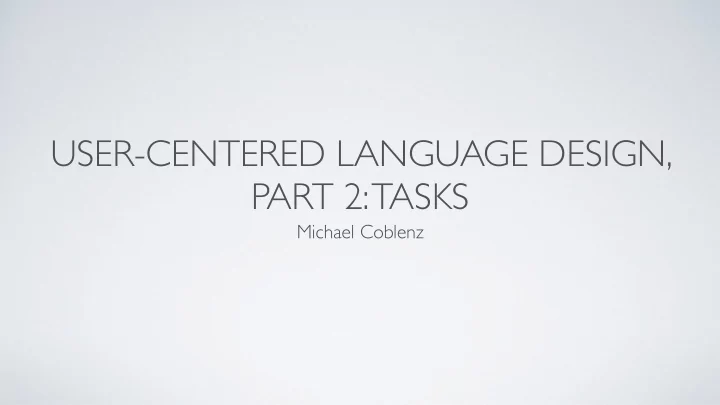

USER-CENTERED LANGUAGE DESIGN, PART 2: TASKS Michael Coblenz
YOUR TURN • Assume you have some tasks for the usability question from before. • Who will you try to recruit? • How will you: • Recruit? • Incentivize? • Screen?
INFORMED CONSENT • Online consent is OK (with IRB approval) • We proposed paper-based consent for this study
DEMOGRAPHICS • Collect information if you want it! • Programming experience? Languages? • If they tell you, you can use it… • e.g. Gender__________
Participant code_________ 7.Please rate your level of expertise in Java by circling one Pre-study questionnaire option: 1.How long have you been programming?______ years ______ beginner intermediate advanced months 8.Please rate your level of expertise in Rust by circling one 2.Gender: _________ option: 3.If you have any academic computer science background, what none beginner intermediate advanced degrees have you completed? If you are partway through a 9.Please rate your level of expertise in each of the following degree, what degree and how far? blockchain programming languages/environments: ______________________________________ Solidity: 4.How much professional (paid) software development I don’t know what this is/none beginner intermediate experience do you have?______ years ______ months advanced 5.List any programming languages in which you are currently Hyperledger Fabric: comfortable programming in DECREASING order of familiarity. I don’t know what this is/none beginner intermediate ______________________________________________ advanced 6.How much experience do you have programming in Java? Include time spent doing Java part-time, such as in a course. Other (specify which)__________________________________ ______ years ______ months
TRAINING • How will you prepare your participants? • People don't read. • People think they understand but in fact do not. • Teach…and then assess. • Or: decide that no training is necessary.
TASKS • This is the hardest part of study design. • You will not get this right the first time. • Solution: pilot repeatedly. • But: you can use data from your "pilots" if you follow protocol. • (a true "pilot" involves throwing the data out) • What is the distribution over task times?
USABILITY STUDY TASKS • Choose an interesting task • One that you think might be hard • One that is central to the usability of your design • Can't test everything
TASK IDEAS • Write a program according to this specification. • Are there bugs in this code? If so, what are they? • Fill in the missing code… • What does this code do? • Answer these questions about this code.
PARSONS PROBLEMS • Participant is given snippets of code, but they are out of order. • Task: put them in the right order. • "We find notable correlation between Parsons scores and code writing scores. We find low correlation between code writing and tracing and between Parsons and tracing." [1] [1] Paul Denny, Andrew Luxton-Reilly, and Beth Simon. 2008. Evaluating a new exam question: Parsons problems. In Proceedings of the Fourth international Workshop on Computing Education Research (ICER ’08). Association for Computing Machinery, New York, NY, USA, 113–124. DOI:https://doi.org/ 10.1145/1404520.1404532
TASK DESIGN • Must carefully restrict tasks! • People will get stuck on irrelevant things • Decide how much help to provide • Ideally: scope task to focus on the variable of interest • Constrain the task as much as possible.
DECOMPOSING TASKS t t Monolithic task Subtasks
DATA COLLECTION • Think-aloud •Take lots of notes!, including • Audio recordings timestamps! You do not want to watch the videos. • Videos •Include a clock on the screen. • Screen capture • Eye tracking • Post-study survey
THINK-ALOUD • Two varieties: concurrent and retrospective • "Please keep talking." • Can't use timing as a dependent variable due to effect of explanations.
TASK CONTEXTS • Pencil/paper • Compiler? • Text editor • Debugger? • IDE • Test cases?
Recommend
More recommend